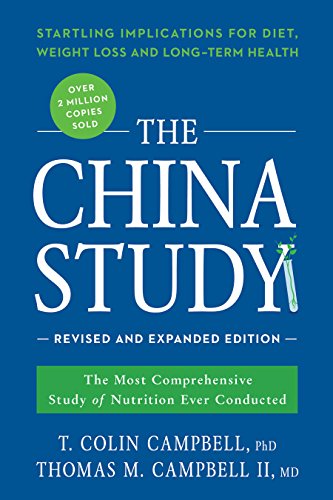

This article is an excerpt from the Shortform summary of "The China Study" by Colin Campbell. Shortform has the world's best summaries of books you should be reading.
Like this article? Sign up for a free trial here .
Heart disease has been the leading cause of death in the U.S. for almost 100 years, killing 40% of Americans and leading to 3,000 heart attacks in America every day. What are the best strategies for heart disease prevention?
Research indicates that you can prevent heart disease by eating more plant-based foods and fewer animal foods. We’ll cover an impressive study of how to prevent heart disease and discuss why doctors don’t share this information.
Research on Heart Disease Prevention Diet
Dr. Dean Ornish: A Pioneer in the Use of Diet to Prevent Heart Disease
Dr. Dean Ornish is a famous pioneer of using diet to prevent heart disease.
A graduate of Harvard Medical School and a popular figure in the media, Dean Ornish is also a pioneer in the field of treating and preventing heart disease with dietary changes. We have Dr. Ornish to thank for some insurance companies covering diet-based disease prevention programs.
The Lifestyle Heart Trial
In this well-known study, Ornish treated Group A with only lifestyle changes. He put Group B on a standard treatment plan. Although this particular study involved treatment of heart disease that’s already developed, many studies indicate that the same dietary changes that reverse heart disease can also prevent heart disease, and are even more effective as prevention than as treatment.
The Diet of Group A in the Lifestyle Heart Trial
- A low-fat, plant-based diet
- Up to 10% of their calories could come from fat
- They could eat as much as they wanted of the foods on their list, which included fruits, vegetables, and grains.
- The only animal products allowed were egg whites and one cup of nonfat milk or yogurt.
Group A also practiced a form of stress relief like meditation or relaxation exercises for at least an hour a day.
Results:
Group A:
- Cholesterol dropped from an average of 227 mg/dL to 172 mg/dL. “Bad” LDL cholesterol decreased from 152 mg/dL to 95 mg/dL.
- Patients experienced a 91% reduction in chest pain.
- Artery blockage decreased by an average of 4%, which is a huge result after only a year.
- Over one year, 82% reversed their heart disease with diet, indicated by a reduction in artery blockage.
Group B:
- Patients experienced a 162% increase in chest pain.
- Artery blockage increased by an average of 8%.
In 1993, Ornish brought the program to eight sites, and by 1998, 40 insurance programs were covering the costs for many of its patients.
Why Don’t Doctors Recommend Diet to Prevent Heart Disease?
Some doctors have criticized Ornish, saying his prevention advice is extreme and that patients won’t adopt these diets. This can be a self-fulfilling prophecy.
If doctors don’t believe patients will follow a plant-based diet, they won’t recommend it, or they’ll mention it in a disparaging, glib way. If this is how the diet is presented to patients (if it’s presented to them at all), they aren’t likely to follow through with it.
When doctors let their personal biases regarding diet affect their recommendations, they disrespect the patient. In doing so, they make several often-incorrect assumptions:
- Assumption #1: That the patient doesn’t want to know lifesaving information.
- Assumption #2: That the patient isn’t willing to do whatever it takes to prevent heart disease.
- Assumption #3: That a plant-based diet is more extreme than invasive surgeries that open a patient’s chest, cut out veins or arteries, and reroute blood flow.
Health organizations such as the American Heart Association and the National Cholesterol Education Program make the same assumptions. They withhold information in favor of recommending “moderation.” They appear to worry that if they recommend the diets that are actually proven to prevent and reverse heart disease, no one will listen to them.
For instance, these organizations tell us that a cholesterol level of 200 mg/dL should be our target, even though studies show that 35% of heart attacks happen to people whose cholesterol is well below 200 mg/dL.
They also tell us that 30% or fewer of our calories should come from fat when studies show that we only make real progress in preventing and reversing heart disease when fat is less than 10% of our total calories.
All these assumptions discourage patients from even trying to alter their diets as a strategy of heart disease prevention.
Summary of Recommendations for Preventing Heart Disease with Diet
- To prevent heart disease, get less than 10% of your calories from fat. Cutting out animal foods makes this easier.
- Cut out foods containing dietary cholesterol (this comes almost solely from animal foods).
- Reduce your intake of milk products—casein has been shown to increase cholesterol levels.
Although changing your diet is difficult, it could be the key to heart disease prevention.
———End of Preview———

Like what you just read? Read the rest of the world's best summary of "The China Study" at Shortform . Learn the book's critical concepts in 20 minutes or less .
Here's what you'll find in our full The China Study summary :
- Why animal proteins (meat, milk) might cause cancer, diabetes, and other diseases
- Why the medical institution is structured to hide the truth about disease and food
- The precise diet you'll need to eat to live longer and feel happier






